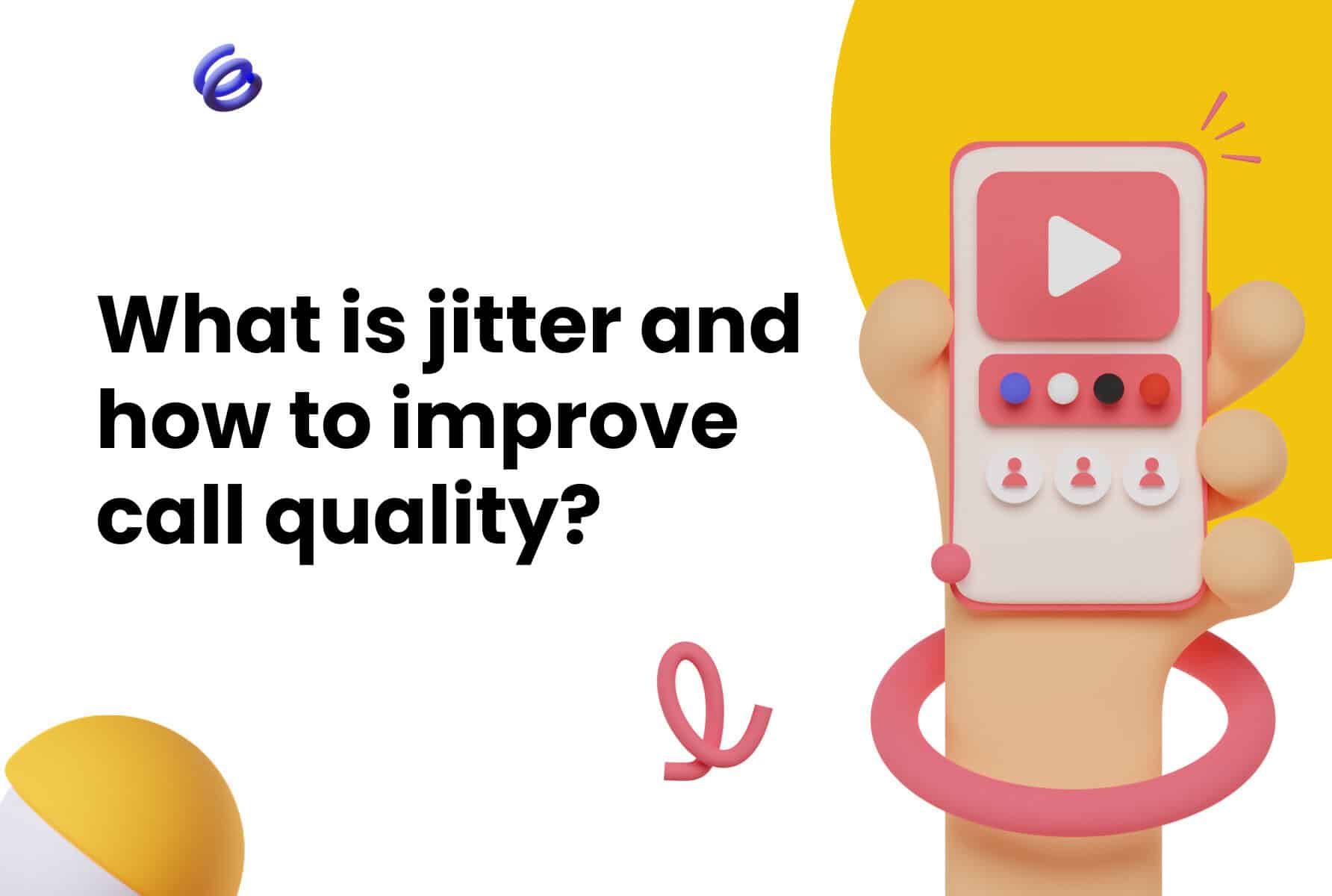Imagine having a communication system that doesn’t just connect calls but brings all your customer interactions into one place, making it easier to track, analyze, and improve every conversation. Well, that’s exactly what VoIP CRM integration offers. It combines the flexibility of VoIP with the organizational power of CRMs, helping businesses easily connect with their customers, streamline their operations, and make smarter decisions based on real-time data.
VoIP CRM Integration: How Does it Work?
What is VoIP?
Voice over Internet Protocol (VoIP) is a technology that enables voice communication over the Internet rather than through traditional phone lines. This makes communication cheaper and more adaptable when working with modern digital tools. VoIP operates by turning your voice into tiny data packets, which travel through the Internet to be pieced back together into sound on the other end.
How CRM Works
The goal of Customer Relationship Management (CRM) software is to improve customer satisfaction, increase sales, and simplify business processes. By storing customer data, tracking interactions, and automating sales and marketing processes, CRMs provide a centralized system for managing customer relationships.
Integration Basics
VoIP CRM integration involves connecting a VoIP system with CRM software for smooth communication and data sharing. This integration allows businesses to make and receive calls directly from the CRM interface, automatically log interactions, and access customer data during calls. This results in a more efficient workflow that improves customer service and sales effectiveness.
Key Components
Successful VoIP CRM integration relies on several key components, including:
- APIs: Application Programming Interfaces (APIs) allow different software systems to communicate with one another. APIs are essential for integrating VoIP and CRM systems, enabling data to easily flow between them.
- User Interfaces: A user-friendly interface is absolutely crucial for ensuring that the integration is easy to use. It should allow users to access all the necessary features, such as call logs and customer data, from one centralized dashboard.
- Reliable Internet Connectivity: Since VoIP relies on the Internet for communication, a stable and high-speed Internet connection is essential for ensuring clear and uninterrupted calls.
- Security Measures: Protecting customer data is extremely important. Strong encryption, secure access controls, and regular security updates are crucial for protecting the information shared between VoIP and CRM systems.
Advantages of VoIP CRM Integration

Cost Savings
One of the main benefits of VoIP CRM integration is the significant cost savings. Traditional phone systems can be expensive to install and maintain, especially for businesses with multiple locations. VoIP systems, on the other hand, typically cost less to operate and maintain. By integrating VoIP with CRM, businesses can reduce the costs associated with customer communication and data management, seeing as they can manage both systems from a single platform.
Boosted Productivity
VoIP CRM integration boosts productivity by automating routine tasks and simplifying workflows. For example, call logging and note-taking can be automated, freeing up time for employees to focus on more important tasks. Additionally, accessing customer information during calls allows for more informed and efficient interactions.
Enhanced Customer Experience
When you connect VoIP with your CRM, you can really upgrade your customer service game. Agents get instant access to customer info during calls so they can offer a more personal touch, solve problems faster, and build better relationships. Plus, with all interactions being recorded and easy to access, it’s simpler to keep your service consistent and of high quality.
Improved Data Management
Integrating VoIP and CRM systems improves data management by centralizing all communication and customer information in one place. This guarantees that customer data is up-to-date and easily accessible, which is key to effective decision-making. It also simplifies data analysis, helping businesses to gain deeper insights into customer behavior and preferences.

Enhancing Data Collection with VoIP CRM Integration
Data collection is an important aspect of any business strategy, and VoIP CRM integration provides a strong platform for collecting and analyzing customer data. CloudCall, for example, offers tools that help businesses use the data collected through VoIP and CRM integration to make highly-informed decisions.
Call Recording
One of the most valuable features of VoIP CRM integration is that businesses can analyze call recordings to identify common customer issues, measure agent performance, and ensure compliance with regulations. These recordings can also be used for training purposes, helping teams improve their communication skills and service quality.
Interaction Logs
Interaction logs automatically keep track of every conversation a business has with its customers, whether it’s calls or text messages. This means everything is recorded and easy to find, giving you a clear picture of the customer’s journey. It’s especially handy for following up on customer issues and making sure they’re sorted out quickly.
Customer Insights
Combining VoIP with CRMs allows a business to better understand its customers. By looking at data from interactions, you can spot trends, preferences, and any challenges that customers are facing. This helps you fine-tune your products, services, and marketing to better match what your customers want and need.
Data Analysis Tools
CloudCall offers various data analysis tools that help businesses make sense of the data collected through VoIP CRM integration. These tools include dashboards, call reporting, and monitoring features that visualize complex data sets and provide actionable insights. By using these tools, businesses can make data-driven decisions that improve customer satisfaction and drive growth.
How to Use VoIP and CRM Integration to Improve Team Efficiency

Combining VoIP and a CRM can really boost your team’s performance, helping to simplify communication and cut down on the time spent on admin tasks.
Direct Calling Features
VoIP CRM integration enables direct calling from the CRM interface, allowing teams to make calls with just a simple click. This feature saves time and reduces the chances of dialing errors. It also ensures that all calls are automatically logged in the CRM, providing a complete record of all customer interactions.
Simplified Post-Call Actions
After a call, several follow-up actions are often necessary, such as logging notes, assigning tasks, or sending follow-up emails. VoIP CRM integration simplifies these post-call actions through automation, reducing the administrative burden on employees so they can focus on more strategic tasks.
Automation Benefits
Automation is one of VoIP CRM integration’s main benefits. By automating routine tasks such as call logging and data entry, businesses can improve efficiency and reduce the risk of human error. Automation also ensures that customer data is consistently updated and accurate, which is essential for effective customer relationship management.
Monitoring Call Metrics
Monitoring call metrics is crucial for assessing your team’s performance and the effectiveness of your communication strategies. VoIP CRM integration provides real-time access to key metrics, such as call duration and call volume. These metrics can be used to identify improvement areas and track the impact of changes to your processes.
Using VoIP & CRM to Strengthen Customer Relationships

VoIP CRM integration offers a powerful way to strengthen customer relationships, by enabling personalized, consistent, and responsive communication.
Personalized Interactions
Personalized interactions are essential for building strong customer relationships. With VoIP CRM integration, businesses can access customer data during calls, allowing them to tailor their communication to each customer’s individual needs and preferences. This level of personalization can significantly improve customer loyalty.
Consistent Communication
Consistency is key to maintaining strong customer relationships. VoIP CRM integration guarantees that all customer interactions are documented and accessible to all team members. This allows businesses to communicate consistently, even when different team members are involved in the customer journey.
Immediate Response Capabilities
VoIP CRM integration significantly improves a business’s ability to quickly respond to customer inquiries and issues. By providing immediate access to customer data and communication tools, teams can address customer concerns in real-time, improving the overall customer experience.
Choosing the Right VoIP System

When choosing a VoIP system, you should consider several key factors to ensure it meets your business needs, including:
- Compatibility Factors: Compatibility with your existing CRM system is crucial. Make sure that the VoIP system you choose seamlessly integrates with your CRM to avoid disruptions and maximize efficiency.
- Feature Comparison: Different VoIP systems offer varied features, so it’s important to compare them based on your specific needs. Look for features such as call recording, analytics, and automation capabilities that will improve your CRM integration.
- User Reviews: User reviews can provide important insights into the performance and reliability of different VoIP systems. Consider feedback from other businesses in your industry to see how well a particular system might work for you.
- Cost Considerations: While cost shouldn’t be the only factor in your decision, it’s important to choose a VoIP system that fits your budget. Consider both the upfront costs and the ongoing maintenance fees when making your decision.
Top VoIP Providers for CRM Integration
Several VoIP providers offer excellent CRM integration capabilities. Here’s a comparison of the top five providers:
CloudCall
CloudCall offers seamless integration with a wide range of CRM systems, making it a great choice for businesses of all sizes. Its features include call recording, real-time analytics, and automation tools that boost productivity and customer service. CloudCall’s focus on ease of use and strong support makes it a top choice for businesses looking to integrate their VoIP and CRM systems.
RingCentral
RingCentral is a popular VoIP provider known for its powerful feature set and strong integration capabilities. It offers advanced call management features and analytics, along with a user-friendly interface. However, it may require more customization compared to CloudCall.
Aircall
Aircall is a cloud-based VoIP provider designed with CRM integration at its core. It easily connects with popular CRMs like Salesforce, HubSpot, and Zoho, making it a go-to solution for businesses looking to streamline their communication processes. With Aircall, you can manage calls directly within your CRM, ensuring all customer interactions are logged and easily accessible. Its user-friendly interface and powerful features, like call routing and analytics, make it an excellent choice for businesses of all sizes.
CloudTalk
CloudTalk offers VoIP solutions with advanced CRM integrations, including compatibility with Pipedrive, HubSpot, and Salesforce. CloudTalk is known for its intuitive platform that allows teams to handle calls, manage customer data, and monitor performance all in one place. CloudTalk’s features, such as automatic call logging and real-time customer data synchronization, help businesses to enhance their customer service and sales efforts, making it a strong contender in the VoIP market.
Dialpad
Dialpad offers a cloud-based VoIP solution with strong AI-powered features, such as voice transcription and smart call routing. It integrates well with most CRMs but may not offer the same level of customer support as CloudCall.
Nextiva
Nextiva’s VoIP solution integrates well with various CRM systems. It offers useful features such as call analytics, customer surveys, and team collaboration tools. However, its interface can be more complex, potentially making it less intuitive than CloudCall, especially for users who prefer a simpler, more streamlined experience.
JustCall
JustCall is a VoIP provider that emphasizes simplicity and ease of use, making it a good choice for small to medium-sized businesses. It integrates well with CRMs like HubSpot, Salesforce, and Zoho, offering essential features such as call recording and analytics. However, it might lack some of the advanced features and customization options that CloudCall offers, which could be a limitation for larger organizations or those with more complex needs.

Selecting the Ideal CRM System

When looking at options for integration, choosing the right CRM system is crucial for maximizing benefits. Here are some top CRM systems and what they offer:
Bullhorn
Bullhorn is a CRM widely used in the staffing and recruitment industries. It offers strong candidate and client relationship management features, including automation tools and powerful reporting capabilities. Bullhorn’s integration with VoIP systems like CloudCall allows recruiters to make calls directly from the CRM, automatically log interactions, and maintain detailed communication records.
Salesforce
Salesforce is one of the most popular CRM systems in the world, known for its extensive customization options and powerful analytics. Its integration with VoIP systems allows businesses to streamline their sales and customer service processes by managing all communications within the CRM. Salesforce’s vast ecosystem of add-ons and third-party integrations makes it a flexible choice for businesses of all sizes.
Vincere
Vincere is a CRM designed specifically for recruitment and staffing agencies. It combines CRM, ATS (Applicant Tracking System), and analytics in one platform, providing an all-in-one tool for managing the entire recruitment process. Vincere’s integration with VoIP systems like CloudCall allows recruiters to easily track communications and enhance candidate and client interactions through features like call recording, call logging, and performance reporting.
Tracker
Tracker is a CRM and ATS platform also aimed at the recruitment and staffing sectors. It offers a range of tools to efficiently manage clients, candidates, and jobs. Tracker’s integration with VoIP services streamlines communication processes by enabling call management directly within the CRM, allowing for automated logging and easy access to communication history, which helps recruiters maintain strong relationships and improve service delivery.
Dynamics 365
Microsoft Dynamics 365 is a CRM system that offers deep integration with other Microsoft products, such as Outlook and Teams. It’s particularly well-suited for businesses that are already heavily invested in the Microsoft ecosystem. Integrating Dynamics 365 with VoIP systems provides businesses with advanced communication tools, including automated call logging, customer data synchronization, and detailed analytics.
VoIP and CRM Integration Use Cases
VoIP and CRM integration is incredibly flexible and can make a big difference across different industries. Here’s how various fields can take advantage of this technology:
Recruitment
In recruitment, timely communication and detailed candidate tracking are extremely important. VoIP CRM integration allows recruiters to manage all candidate interactions from within the CRM, making it easier to follow progress and maintain a record of all communications. For example, recruiters can make calls directly from the CRM, automatically log notes, and schedule follow-ups, ensuring that no candidate slips through the cracks.
Customer Service
For customer service teams, VoIP CRM integration is useful for providing quick and efficient support. By having access to customer history and data during calls, service agents can resolve issues faster and provide more personalized support. Features like call recording and interaction logs also allow managers to monitor performance and ensure high service standards.
Sales
Sales teams also significantly benefit from VoIP CRM integration, as it streamlines the entire sales process. Sales reps can make calls directly from the CRM, access customer data in real-time, and automate follow-up tasks. This integration helps teams close deals faster and maintain stronger relationships with prospects and customers.
VoIP and CRM Integration Capabilities
VoIP and CRM integration just keeps getting better as new trends and technologies push the boundaries of what businesses can do.
Future Trends
As technology advances, the future of VoIP CRM integration looks promising. Emerging trends such as artificial intelligence, machine learning, and big data analytics are expected to play a significant role in enhancing integration capabilities. AI-powered features like predictive analytics and sentiment analysis will allow businesses to anticipate customer needs and tailor their communication strategies accordingly. Additionally, as remote work continues to grow, VoIP CRM integration will become essential for maintaining smooth communication and collaboration across distributed teams.
To sum up, combining VoIP with CRM is a smart move for businesses aiming to improve how they communicate and manage customer relationships. This integration boosts productivity, enhances customer interactions, and helps you make better decisions. CloudCall, with its easy-to-use interface and smooth integration, is a great choice for businesses looking to bring their communication channels together.
As technology evolves, integrating VoIP with CRM will become a must-have for staying ahead of the competition. By selecting the right systems and fully utilizing their features, businesses can ensure they remain agile, responsive, and ready to meet the demands of a rapidly changing market.




